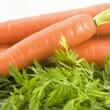Background
- Carrot (Daucus carota) is a well-known root vegetable. The thick tap root's color can range from white to orange to red or purple. This change in color represents the nutrients in the carrot because some pigments, such as beta-carotene and lycopene, are also nutrients.
- Carrot probably originated around Afghanistan where there is the greatest variety of carrots today. Usually only the root is consumed, although the leaves are also edible. Although primarily used as a food source, carrots have also traditionally been used to treat infantile diarrhea. Carrot roots have been used to treat digestive problems, intestinal parasites, and tonsillitis. Other potential uses include vitamin A deficiency, antioxidant activity, constipation, and anemia. More research is need in all of these areas as the currently available research is of low quality.
References
Natural Standard developed the above evidence-based information based on a thorough systematic review of the available scientific articles. For comprehensive information about alternative and complementary therapies on the professional level, go to . Selected references are listed below.
- Agte V, Jahagirdar M, Chiplonkar S. GLV supplements increased plasma beta-carotene, vitamin C, zinc and hemoglobin in young healthy adults. Eur J Nutr 2006;45(1):29-36.
View Abstract - Briviba K, Schnabele K, Rechkemmer G, et al. Supplementation of a diet low in carotenoids with tomato or carrot juice does not affect lipid peroxidation in plasma and feces of healthy men. J Nutr 2004;134(5):1081-1083.
View Abstract - Bub A., Barth SW, Watzl B, et al. Paraoxonase 1 Q192R (PON1-192) polymorphism is associated with reduced lipid peroxidation in healthy young men on a low-carotenoid diet supplemented with tomato juice. Br J Nutr 2005;93(3):291-297.
View Abstract - Cardinault N, Tyssandier V, Grolier P, et al. Comparison of the postprandial chylomicron carotenoid responses in young and older subjects. Eur J Nutr 2003;42(6):315-323.
View Abstract - Donaldson MS, Speight N, Loomis S. Fibromyalgia syndrome improved using a mostly raw vegetarian diet: an observational study. BMC Complement Altern Med 2001;1:7.
View Abstract - el Arab AE, Khalil F, Hussein L. Vitamin A deficiency among preschool children in a rural area of Egypt: the results of dietary assessment and biochemical assay. Int J Food Sci Nutr 2002;53(6):465-474.
View Abstract - Gerrish CJ, Mennella JA. Flavor variety enhances food acceptance in formula-fed infants. Am J Clin Nutr 2001;73(6):1080-1085.
View Abstract - Horvitz MA, Simon PW, Tanumihardjo SA. Lycopene and beta-carotene are bioavailable from lycopene 'red' carrots in humans. Eur J Clin Nutr 2004;58(5):803-811.
View Abstract - Kurilich AC, Clevidence BA, Britz SJ, et al. Plasma and urine responses are lower for acylated vs nonacylated anthocyanins from raw and cooked purple carrots. J Agric Food Chem 8-10-2005;53(16):6537-6542.
View Abstract - Moller P, Loft S. Oxidative DNA damage in human white blood cells in dietary antioxidant intervention studies. Am J Clin Nutr 2002;76(2):303-310.
View Abstract - Ncube TN, Greiner T, Malaba LC, et al. Supplementing lactating women with pureed papaya and grated carrots improved vitamin A status in a placebo-controlled trial. J Nutr 2001;131(5):1497-1502.
View Abstract - Thurmann PA, Steffen J, Zwernemann C, et al. Plasma concentration response to drinks containing beta-carotene as carrot juice or formulated as a water dispersible powder. Eur J Nutr 2002;41(5):228-235.
View Abstract - Tyssandier V, Reboul E, Dumas JF, et al. Processing of vegetable-borne carotenoids in the human stomach and duodenum. Am J Physiol Gastrointest Liver Physiol 2003;284(6):G913-G923.
View Abstract - Vieths S, Scheurer S, Ballmer-Weber B. Current understanding of cross-reactivity of food allergens and pollen. Ann NY Acad Sci 2002;964:47-68.
View Abstract - Watzl B, Bub A, Briviba K, et al. Supplementation of a low-carotenoid diet with tomato or carrot juice modulates immune functions in healthy men. Ann Nutr Metab 2003;47(6):255-261.
View Abstract







